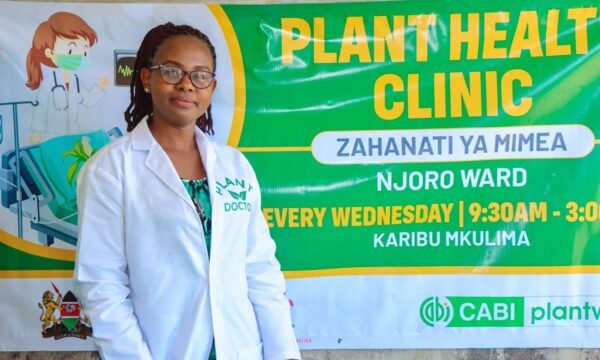
Plant clinics in Sri Lanka, known as the Permanent Crop Clinic Programme, continue to grow and modernize throughout the country. After successfully rolling out e-plant clinics in several provinces in Sri Lanka, the younger generation of agricultural extension workers is now feeling just as confident in solving crop health issues as their senior colleagues did in the past. Nevertheless, some older farmers do not always take the advice from younger extension workers believing that their years of experience in farming is much greater than the age of “such young extensionists”.
Plantwise Sri Lanka hosted the annual progress review and way forward meeting in December where a number of partners echoed that having an expert in the plant clinics would attract more farmers and in particular convince older farmers to attend the clinic. However, bringing together experts and plant doctors to conduct plant clinics in remote areas presents some practical and operational issues.
By embedding growing communication technologies and bringing experts into the existing plant clinics remotely, the Department of Agriculture has started a Skype service, therefore hitting two mangoes with one stone. The Skype service was launched on 15 February 2018 at Rathnapuram village in Kilinochchi District.

A panel of experts diagnose farmers’ problems via Skype video call
A plant clinic was organized by the Kilinochchi District Coordinator and plant doctor, Mr. G. Elangeeran in a common hall of the village and it was attended by 24 farmers. Three plant doctors assisted the plant clinic and Mr. A. Vakeesan, CABI Associate, linked farmers remotely with experts on Skype and also translated whenever needed.
The remote advisory service was also organized simultaneously by Mr. S. Periyasamy, Additional Director (Communication), National Agriculture Information and Communication Centre (NAICC) of the Department of Agriculture, Kandy. The NAICC team extended their technical advice with the help of plant pathologist, Dr. Lakmini Priyantha, Additional Director, Seed Certification Services of the Department of Agriculture, Kandy.

Farmers show a whole banana leaf for diagnosing support
Farmers brought along a range of plant samples, including those with more difficult or complex problems, all of which were shown to the experts via Skype video call. To ascertain as much background information as possible, the experts asked sets of questions which the farmers were keen to answer. The majority of samples had suspected viral/bacterial infections which the experts then diagnosed. Shortly after the discussion, the plant doctors used their tablets to record all the problems, and recommendations were made based on the experts’ advice.
This advanced facility proved very useful by providing a platform to remotely connect grassroots farmers with experts who can deliver advice instantly from the Department of Agriculture office. This innovative system will attract more farmers to the clinic and discourage them from getting poor advice from other sources such as neighbours and agro input suppliers. In addition, it provides an opportunity for plant doctors to learn more on integrated crop management.
Cyber extension units of Agriculture Extension Centres could be incorporated with the Skype service to deliver better advice for farmers in the future. However, it does require very good mobile signal strength or cable-connected internet to carry out Skype video calls with little hindrance. This is the only limiting factor to having a such a service in all cyber extension units of the Agriculture Extension Centres in Sri Lanka.
The service enhances the existing plant clinics and shows how both farming and agricultural advisory services are improving and evolving in Sri Lanka.
2 Comments
Leave a Reply
Related News & Blogs
Training Sri Lanka’s agro-dealers in pesticide risk reduction
Agro-dealers provide vital support to Sri Lanka’s farmers. These agricultural input suppliers are often the first point of contact for smallholders who need advice on plant protection products. However, agro-dealers often lack formal training in safer…
3 July 2025





[…] https://blog.plantwise.org/2018/02/28/sri-lanka-launches-skype-service-to-further-strengthen-advisor…https://blog.plantwise.org/2020/05/13/spotted-coffee-grasshopper-in-bangladesh/ https://blog.plantwise.org/2020/06/25/lockdown-unlocking-technology-for-indias-farmers/ https://blog.plantwise.org/2020/05/20/pests-in-a-pandemic-india-plant-doctors-will-see-you-online-now/ […]
[…] Sri Lanka launches Skype service to further strengthen advisory support in plant clinics […]